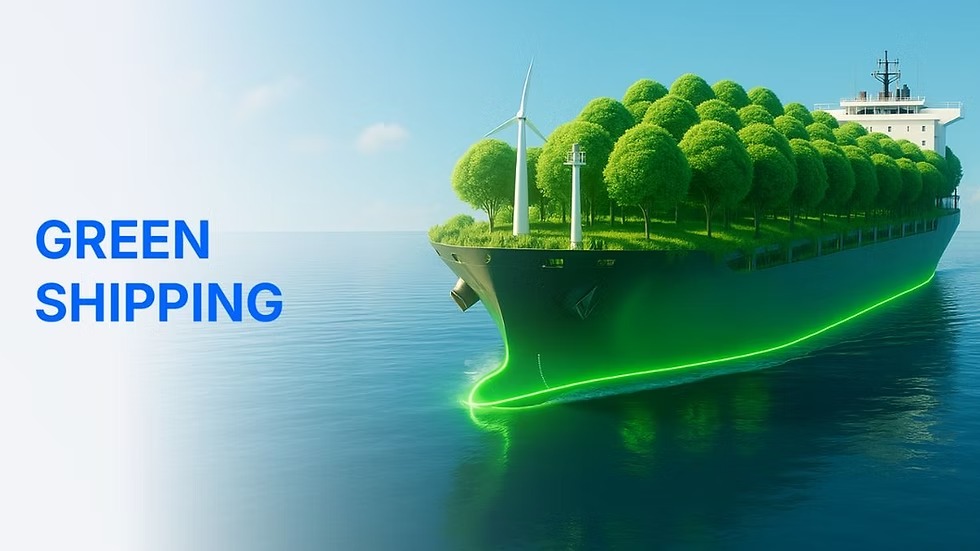
Global Maritime Leaders convene to shape Green Shipping Regulations
LONDON : The world’s largest maritime nations gathered in London on Tuesday to consider adopting regulations that would move the shipping industry away from fossil fuels to slash emissions.
If the deal is adopted, this will be the first time a global fee is imposed on planet-warming greenhouse gas emissions. Most ships today run on heavy fuel oil that releases carbon dioxide and other pollutants as it’s burned.
Nations are meeting at the International Maritime Organization headquarters through Friday. The Trump administration unequivocally rejects the proposal and has threatened to retaliate if nations support it, setting the stage for a fight over the climate deal.
In April, IMO member states agreed on the contents of the regulatory framework. The aim is to adopt it at this meeting.
That would be a major win for the climate, public health, the ocean and marine life, said Delaine McCullough at the Ocean Conservancy. For too long, ships have run on crude, dirty oil, she said.
“This agreement provides a lesson for the world that legally-binding climate action is possible,” said McCullough, shipping program director for the nonprofit environmental advocacy group.
“The energy and digital transition of shipping have already started. However, the absence of global regulations will increase the costs of this transition in the long run,” said Arsenio Dominguez, Secretary-General of the IMO, during his opening remarks at the meeting.
Shipping emissions have grown over the past decade to about 3% of the global total as trade has grown and vessels use immense amounts of fossil fuels to transport cargo over long distances.
The regulations, or “Net-zero Framework,” set a marine fuel standard that decreases, over time, the amount of greenhouse gas emissions allowed from using shipping fuels. The regulations also establish a pricing system that would impose fees for every ton of greenhouse gases emitted by ships above allowable limits, in what is effectively the first global tax on greenhouse gas emissions.
There’s a base level of compliance for the allowable greenhouse gas intensity of fuels. There’s a more stringent direct compliance target that requires further reduction in the greenhouse gas intensity.
If ships sail on fuels with lower emissions than what’s required under the direct compliance target, they earn “surplus units,” effectively credits.
Ships with the highest emissions would have to buy those credits from other ships under the pricing system, or from the IMO at $380 per ton of carbon dioxide equivalent to reach the base level of compliance. In addition, there’s a penalty of $100 per ton of carbon dioxide equivalent to reach direct compliance.
Ships that meet the base target but not the direct compliance one must pay the $100 per ton penalty too.
Ships whose greenhouse gas intensity is below a certain threshold will receive rewards for their performance.
The fees could generate $11 billion to $13 billion in revenue annually. That would go into an IMO fund to invest in fuels and technologies needed to transition to green shipping, reward low-emission ships and support developing countries so they aren’t left behind with dirty fuels and old ships.
The vote at the London meeting
The IMO aims for consensus in decision-making but it’s likely nations will vote on adopting the regulations.
At the April meeting, a vote was called to approve the contents of the regulations. The United States was notably absent in April, but plans to participate in this meeting.
During the opening session on Tuesday, Saudi Arabia, the U.S., Russia and a few other countries intervened to express their reservations about the meeting’s agenda, which strongly focuses on adopting the Net-zero Framework by the end of the week.
Teresa Bui at Pacific Environment said she is optimistic “global momentum is on our side” and a majority of countries will support adoption. Bui is senior climate campaign director for the environmental nonprofit, which has consultative, or non-voting, status at the IMO.
If it fails, shipping’s decarbonization will be further delayed.
“It’s difficult to know for sure what the precise consequences will be, but failure this week will certainly lead to delay, which means ships will emit more greenhouse gases than they would have done and for longer, continuing their outsized contribution to the climate crisis,” said John Maggs, of the Clean Shipping Coalition, who is at the London meeting.
Source : AP News
